NURS2098: Recovery Focused Nursing Care Plan for Marie - Postpartum
VerifiedAdded on 2023/04/06
|13
|1996
|492
Report
AI Summary
This assignment presents a recovery-focused nursing care plan for Marie, a 31-year-old woman experiencing postpartum depression. The plan identifies Marie's strengths, such as her willingness to engage with psychiatric and psychotherapeutic interventions and her desire to care for her daughter. Priority goals include addressing her depressive symptoms, improving her energy and mood, and reducing suicidal ideation. Interventions involve psychiatric consultation, psychoeducation, and setting short-term goals. The plan emphasizes a collaborative approach involving Marie, her family, and healthcare professionals. The care plan also addresses nutritional needs and social interaction to promote overall well-being and recovery. The assignment references several research articles to support the chosen interventions and approaches.
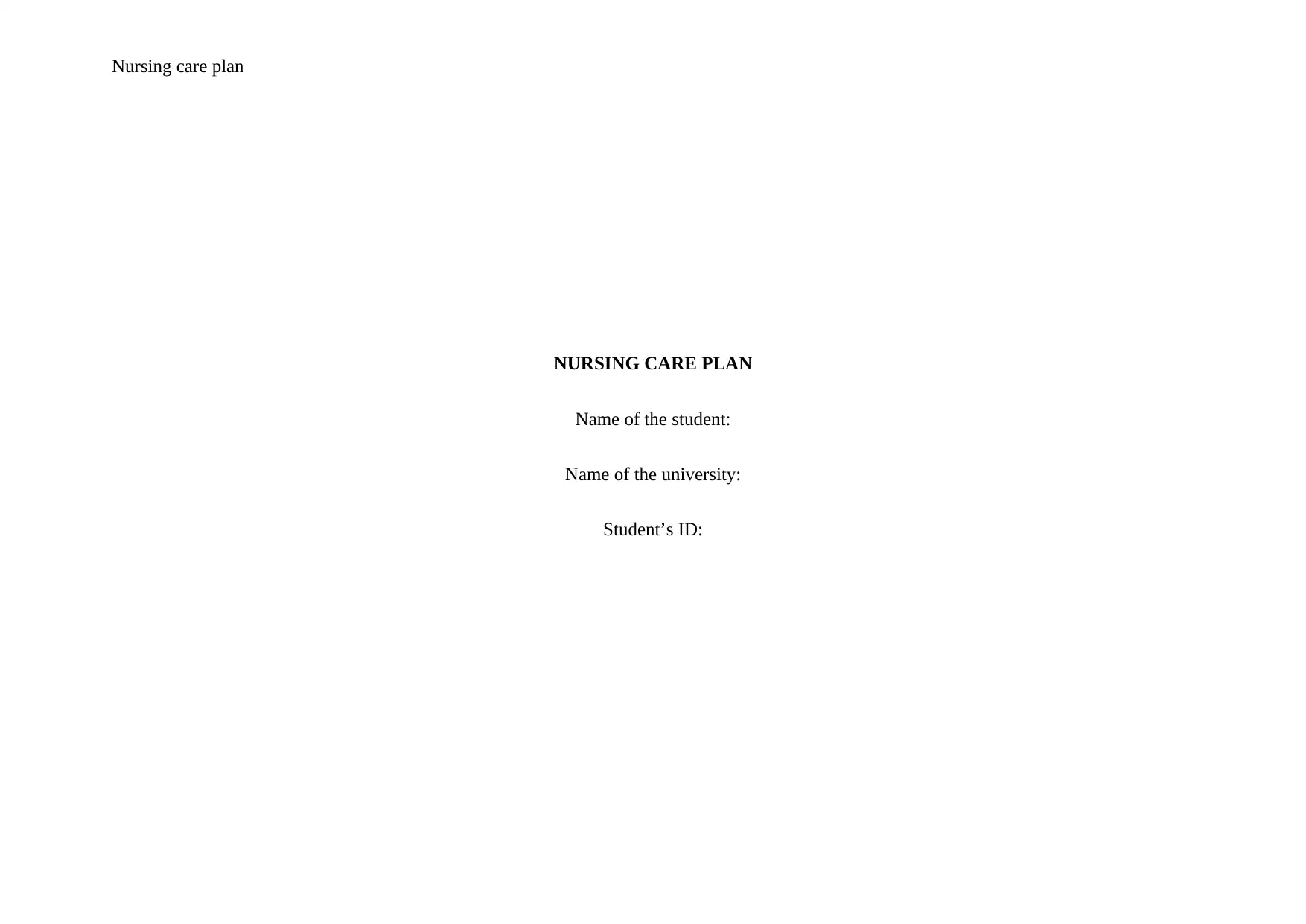
Nursing care plan
NURSING CARE PLAN
Name of the student:
Name of the university:
Student’s ID:
NURSING CARE PLAN
Name of the student:
Name of the university:
Student’s ID:
Paraphrase This Document
Need a fresh take? Get an instant paraphrase of this document with our AI Paraphraser
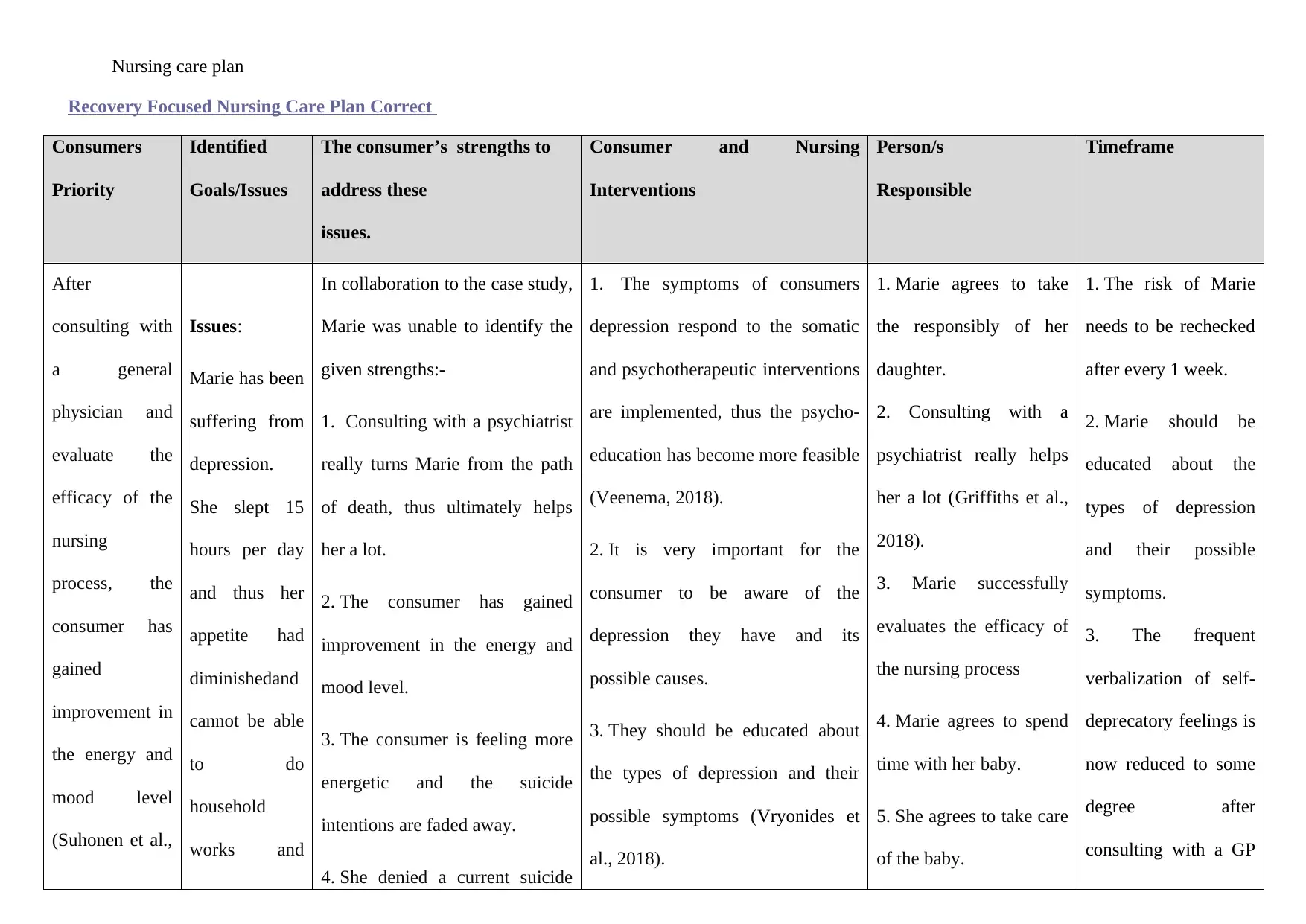
Nursing care plan
Recovery Focused Nursing Care Plan Correct
Consumers
Priority
Identified
Goals/Issues
The consumer’s strengths to
address these
issues.
Consumer and Nursing
Interventions
Person/s
Responsible
Timeframe
After
consulting with
a general
physician and
evaluate the
efficacy of the
nursing
process, the
consumer has
gained
improvement in
the energy and
mood level
(Suhonen et al.,
Issues:
Marie has been
suffering from
depression.
She slept 15
hours per day
and thus her
appetite had
diminishedand
cannot be able
to do
household
works and
In collaboration to the case study,
Marie was unable to identify the
given strengths:-
1. Consulting with a psychiatrist
really turns Marie from the path
of death, thus ultimately helps
her a lot.
2. The consumer has gained
improvement in the energy and
mood level.
3. The consumer is feeling more
energetic and the suicide
intentions are faded away.
4. She denied a current suicide
1. The symptoms of consumers
depression respond to the somatic
and psychotherapeutic interventions
are implemented, thus the psycho-
education has become more feasible
(Veenema, 2018).
2. It is very important for the
consumer to be aware of the
depression they have and its
possible causes.
3. They should be educated about
the types of depression and their
possible symptoms (Vryonides et
al., 2018).
1. Marie agrees to take
the responsibly of her
daughter.
2. Consulting with a
psychiatrist really helps
her a lot (Griffiths et al.,
2018).
3. Marie successfully
evaluates the efficacy of
the nursing process
4. Marie agrees to spend
time with her baby.
5. She agrees to take care
of the baby.
1. The risk of Marie
needs to be rechecked
after every 1 week.
2. Marie should be
educated about the
types of depression
and their possible
symptoms.
3. The frequent
verbalization of self-
deprecatory feelings is
now reduced to some
degree after
consulting with a GP
Recovery Focused Nursing Care Plan Correct
Consumers
Priority
Identified
Goals/Issues
The consumer’s strengths to
address these
issues.
Consumer and Nursing
Interventions
Person/s
Responsible
Timeframe
After
consulting with
a general
physician and
evaluate the
efficacy of the
nursing
process, the
consumer has
gained
improvement in
the energy and
mood level
(Suhonen et al.,
Issues:
Marie has been
suffering from
depression.
She slept 15
hours per day
and thus her
appetite had
diminishedand
cannot be able
to do
household
works and
In collaboration to the case study,
Marie was unable to identify the
given strengths:-
1. Consulting with a psychiatrist
really turns Marie from the path
of death, thus ultimately helps
her a lot.
2. The consumer has gained
improvement in the energy and
mood level.
3. The consumer is feeling more
energetic and the suicide
intentions are faded away.
4. She denied a current suicide
1. The symptoms of consumers
depression respond to the somatic
and psychotherapeutic interventions
are implemented, thus the psycho-
education has become more feasible
(Veenema, 2018).
2. It is very important for the
consumer to be aware of the
depression they have and its
possible causes.
3. They should be educated about
the types of depression and their
possible symptoms (Vryonides et
al., 2018).
1. Marie agrees to take
the responsibly of her
daughter.
2. Consulting with a
psychiatrist really helps
her a lot (Griffiths et al.,
2018).
3. Marie successfully
evaluates the efficacy of
the nursing process
4. Marie agrees to spend
time with her baby.
5. She agrees to take care
of the baby.
1. The risk of Marie
needs to be rechecked
after every 1 week.
2. Marie should be
educated about the
types of depression
and their possible
symptoms.
3. The frequent
verbalization of self-
deprecatory feelings is
now reduced to some
degree after
consulting with a GP
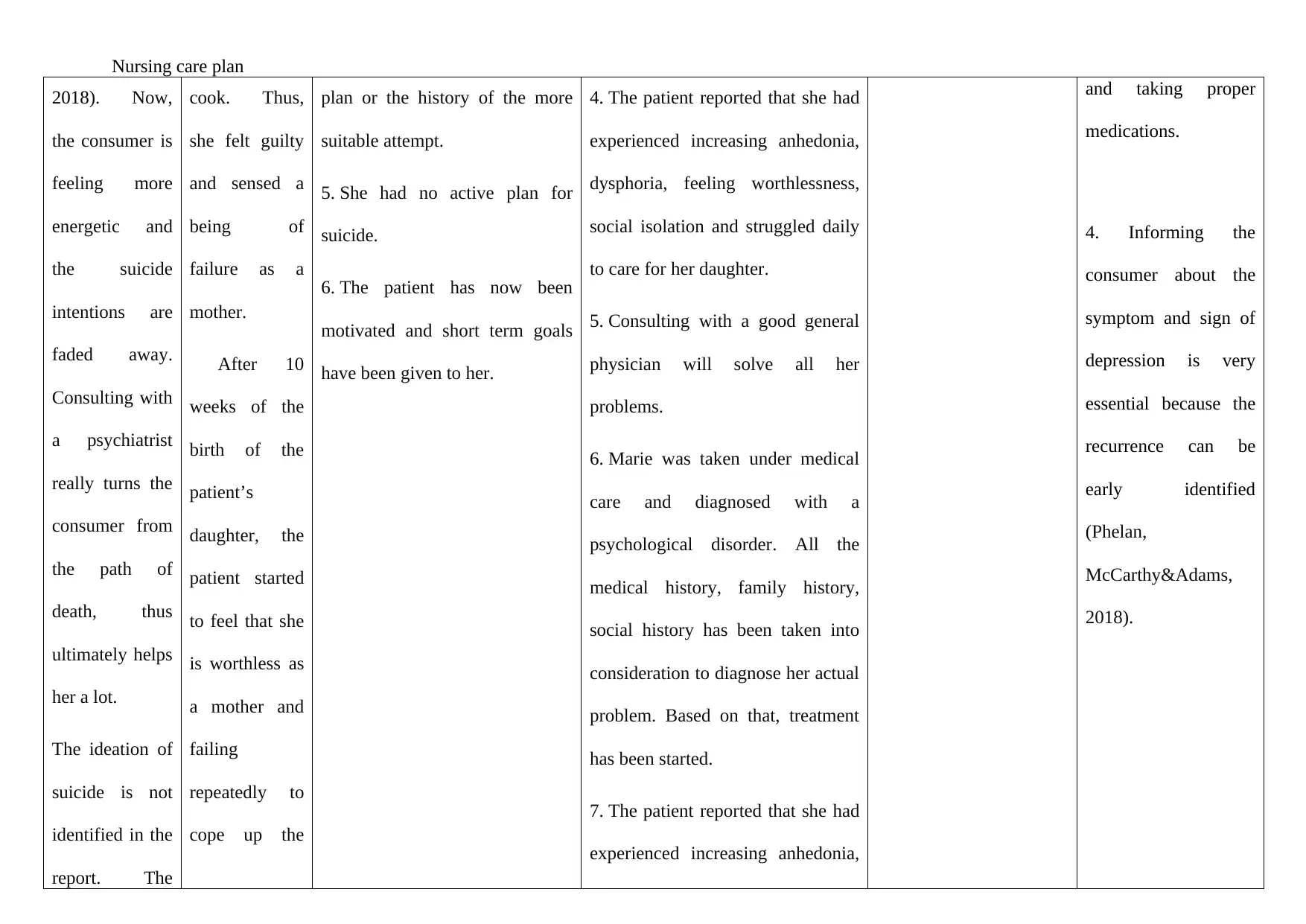
Nursing care plan
2018). Now,
the consumer is
feeling more
energetic and
the suicide
intentions are
faded away.
Consulting with
a psychiatrist
really turns the
consumer from
the path of
death, thus
ultimately helps
her a lot.
The ideation of
suicide is not
identified in the
report. The
cook. Thus,
she felt guilty
and sensed a
being of
failure as a
mother.
After 10
weeks of the
birth of the
patient’s
daughter, the
patient started
to feel that she
is worthless as
a mother and
failing
repeatedly to
cope up the
plan or the history of the more
suitable attempt.
5. She had no active plan for
suicide.
6. The patient has now been
motivated and short term goals
have been given to her.
4. The patient reported that she had
experienced increasing anhedonia,
dysphoria, feeling worthlessness,
social isolation and struggled daily
to care for her daughter.
5. Consulting with a good general
physician will solve all her
problems.
6. Marie was taken under medical
care and diagnosed with a
psychological disorder. All the
medical history, family history,
social history has been taken into
consideration to diagnose her actual
problem. Based on that, treatment
has been started.
7. The patient reported that she had
experienced increasing anhedonia,
and taking proper
medications.
4. Informing the
consumer about the
symptom and sign of
depression is very
essential because the
recurrence can be
early identified
(Phelan,
McCarthy&Adams,
2018).
2018). Now,
the consumer is
feeling more
energetic and
the suicide
intentions are
faded away.
Consulting with
a psychiatrist
really turns the
consumer from
the path of
death, thus
ultimately helps
her a lot.
The ideation of
suicide is not
identified in the
report. The
cook. Thus,
she felt guilty
and sensed a
being of
failure as a
mother.
After 10
weeks of the
birth of the
patient’s
daughter, the
patient started
to feel that she
is worthless as
a mother and
failing
repeatedly to
cope up the
plan or the history of the more
suitable attempt.
5. She had no active plan for
suicide.
6. The patient has now been
motivated and short term goals
have been given to her.
4. The patient reported that she had
experienced increasing anhedonia,
dysphoria, feeling worthlessness,
social isolation and struggled daily
to care for her daughter.
5. Consulting with a good general
physician will solve all her
problems.
6. Marie was taken under medical
care and diagnosed with a
psychological disorder. All the
medical history, family history,
social history has been taken into
consideration to diagnose her actual
problem. Based on that, treatment
has been started.
7. The patient reported that she had
experienced increasing anhedonia,
and taking proper
medications.
4. Informing the
consumer about the
symptom and sign of
depression is very
essential because the
recurrence can be
early identified
(Phelan,
McCarthy&Adams,
2018).
⊘ This is a preview!⊘
Do you want full access?
Subscribe today to unlock all pages.

Trusted by 1+ million students worldwide
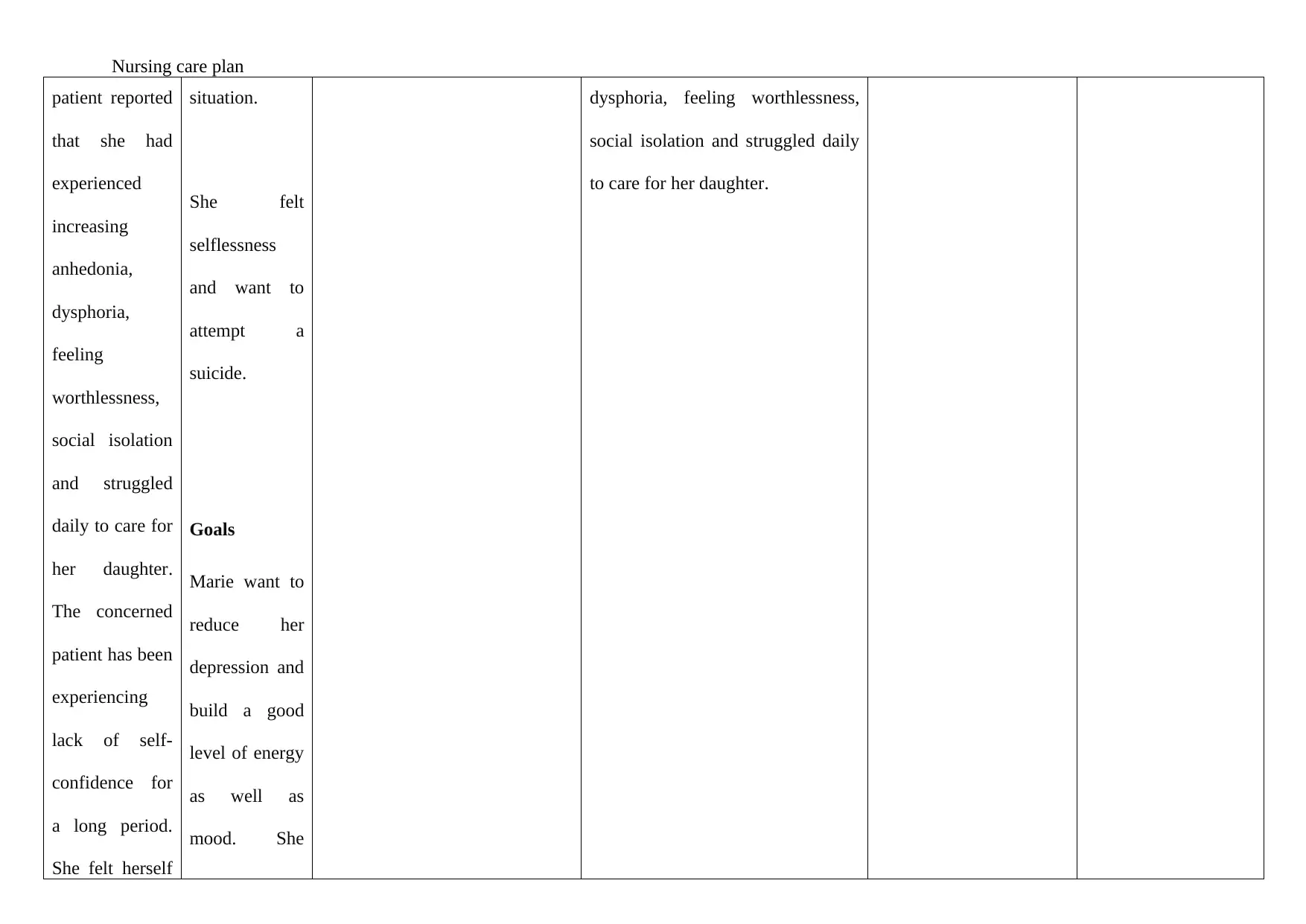
Nursing care plan
patient reported
that she had
experienced
increasing
anhedonia,
dysphoria,
feeling
worthlessness,
social isolation
and struggled
daily to care for
her daughter.
The concerned
patient has been
experiencing
lack of self-
confidence for
a long period.
She felt herself
situation.
She felt
selflessness
and want to
attempt a
suicide.
Goals
Marie want to
reduce her
depression and
build a good
level of energy
as well as
mood. She
dysphoria, feeling worthlessness,
social isolation and struggled daily
to care for her daughter.
patient reported
that she had
experienced
increasing
anhedonia,
dysphoria,
feeling
worthlessness,
social isolation
and struggled
daily to care for
her daughter.
The concerned
patient has been
experiencing
lack of self-
confidence for
a long period.
She felt herself
situation.
She felt
selflessness
and want to
attempt a
suicide.
Goals
Marie want to
reduce her
depression and
build a good
level of energy
as well as
mood. She
dysphoria, feeling worthlessness,
social isolation and struggled daily
to care for her daughter.
Paraphrase This Document
Need a fresh take? Get an instant paraphrase of this document with our AI Paraphraser
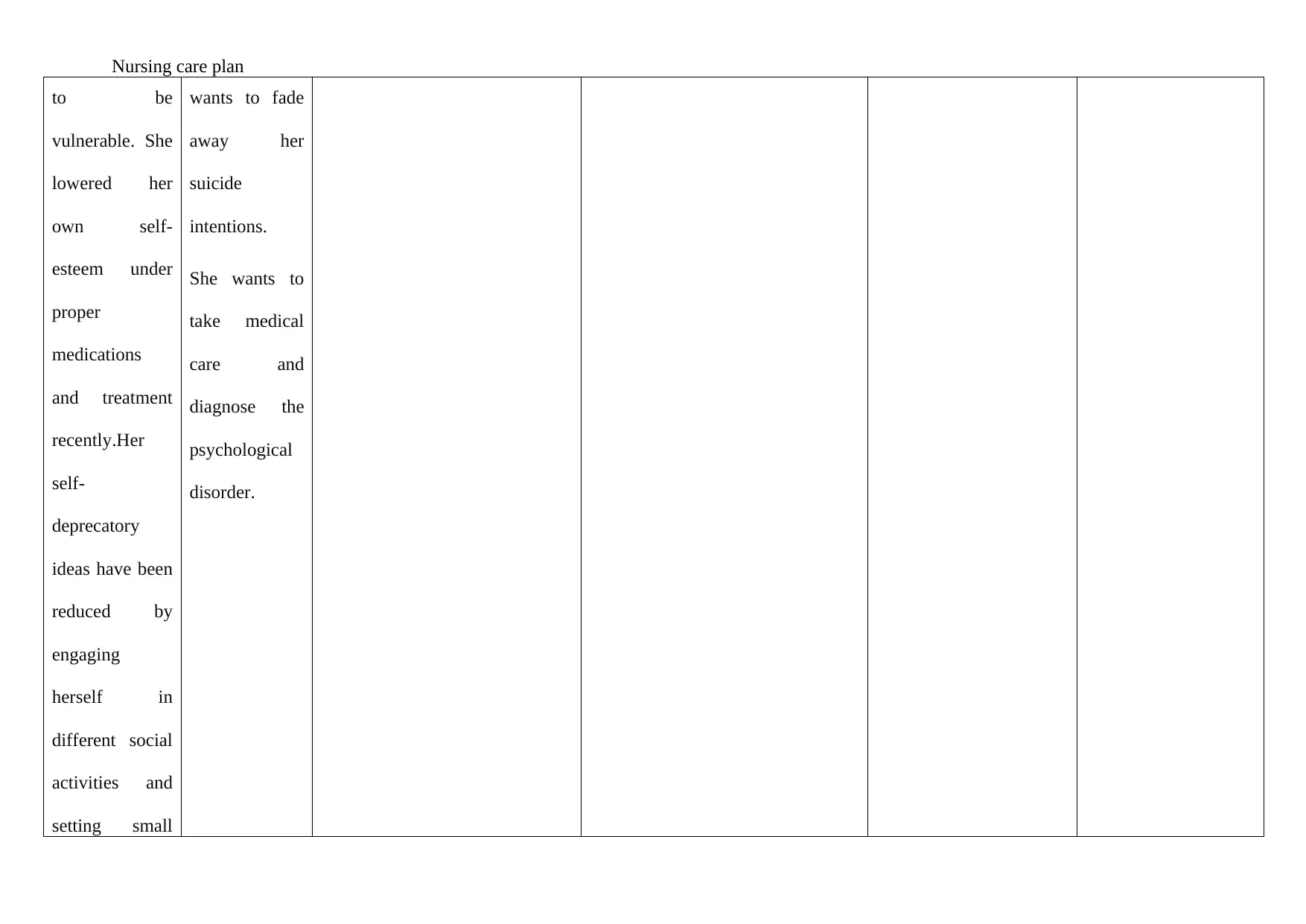
Nursing care plan
to be
vulnerable. She
lowered her
own self-
esteem under
proper
medications
and treatment
recently.Her
self-
deprecatory
ideas have been
reduced by
engaging
herself in
different social
activities and
setting small
wants to fade
away her
suicide
intentions.
She wants to
take medical
care and
diagnose the
psychological
disorder.
to be
vulnerable. She
lowered her
own self-
esteem under
proper
medications
and treatment
recently.Her
self-
deprecatory
ideas have been
reduced by
engaging
herself in
different social
activities and
setting small
wants to fade
away her
suicide
intentions.
She wants to
take medical
care and
diagnose the
psychological
disorder.
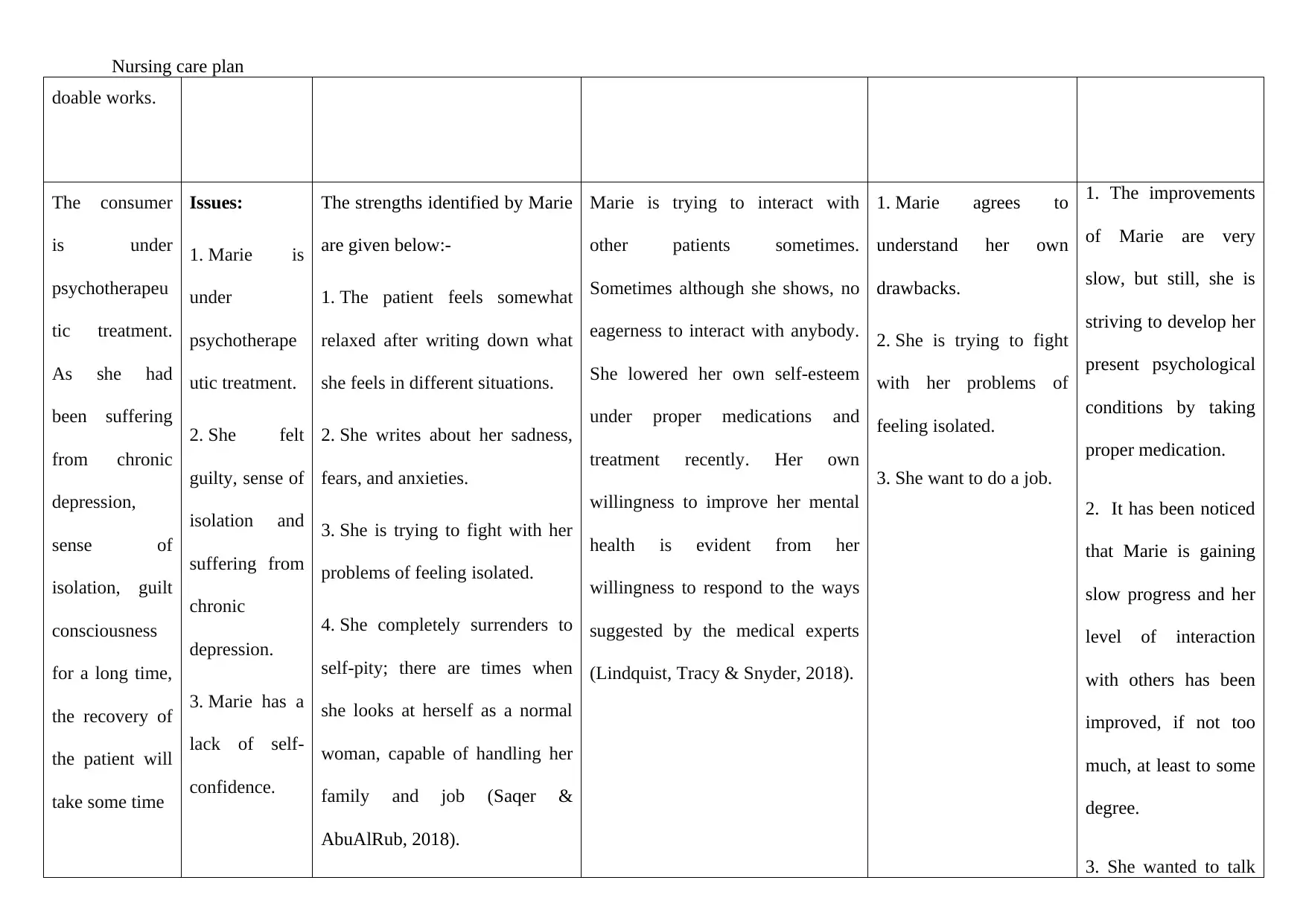
Nursing care plan
doable works.
The consumer
is under
psychotherapeu
tic treatment.
As she had
been suffering
from chronic
depression,
sense of
isolation, guilt
consciousness
for a long time,
the recovery of
the patient will
take some time
Issues:
1. Marie is
under
psychotherape
utic treatment.
2. She felt
guilty, sense of
isolation and
suffering from
chronic
depression.
3. Marie has a
lack of self-
confidence.
The strengths identified by Marie
are given below:-
1. The patient feels somewhat
relaxed after writing down what
she feels in different situations.
2. She writes about her sadness,
fears, and anxieties.
3. She is trying to fight with her
problems of feeling isolated.
4. She completely surrenders to
self-pity; there are times when
she looks at herself as a normal
woman, capable of handling her
family and job (Saqer &
AbuAlRub, 2018).
Marie is trying to interact with
other patients sometimes.
Sometimes although she shows, no
eagerness to interact with anybody.
She lowered her own self-esteem
under proper medications and
treatment recently. Her own
willingness to improve her mental
health is evident from her
willingness to respond to the ways
suggested by the medical experts
(Lindquist, Tracy & Snyder, 2018).
1. Marie agrees to
understand her own
drawbacks.
2. She is trying to fight
with her problems of
feeling isolated.
3. She want to do a job.
1. The improvements
of Marie are very
slow, but still, she is
striving to develop her
present psychological
conditions by taking
proper medication.
2. It has been noticed
that Marie is gaining
slow progress and her
level of interaction
with others has been
improved, if not too
much, at least to some
degree.
3. She wanted to talk
doable works.
The consumer
is under
psychotherapeu
tic treatment.
As she had
been suffering
from chronic
depression,
sense of
isolation, guilt
consciousness
for a long time,
the recovery of
the patient will
take some time
Issues:
1. Marie is
under
psychotherape
utic treatment.
2. She felt
guilty, sense of
isolation and
suffering from
chronic
depression.
3. Marie has a
lack of self-
confidence.
The strengths identified by Marie
are given below:-
1. The patient feels somewhat
relaxed after writing down what
she feels in different situations.
2. She writes about her sadness,
fears, and anxieties.
3. She is trying to fight with her
problems of feeling isolated.
4. She completely surrenders to
self-pity; there are times when
she looks at herself as a normal
woman, capable of handling her
family and job (Saqer &
AbuAlRub, 2018).
Marie is trying to interact with
other patients sometimes.
Sometimes although she shows, no
eagerness to interact with anybody.
She lowered her own self-esteem
under proper medications and
treatment recently. Her own
willingness to improve her mental
health is evident from her
willingness to respond to the ways
suggested by the medical experts
(Lindquist, Tracy & Snyder, 2018).
1. Marie agrees to
understand her own
drawbacks.
2. She is trying to fight
with her problems of
feeling isolated.
3. She want to do a job.
1. The improvements
of Marie are very
slow, but still, she is
striving to develop her
present psychological
conditions by taking
proper medication.
2. It has been noticed
that Marie is gaining
slow progress and her
level of interaction
with others has been
improved, if not too
much, at least to some
degree.
3. She wanted to talk
⊘ This is a preview!⊘
Do you want full access?
Subscribe today to unlock all pages.

Trusted by 1+ million students worldwide
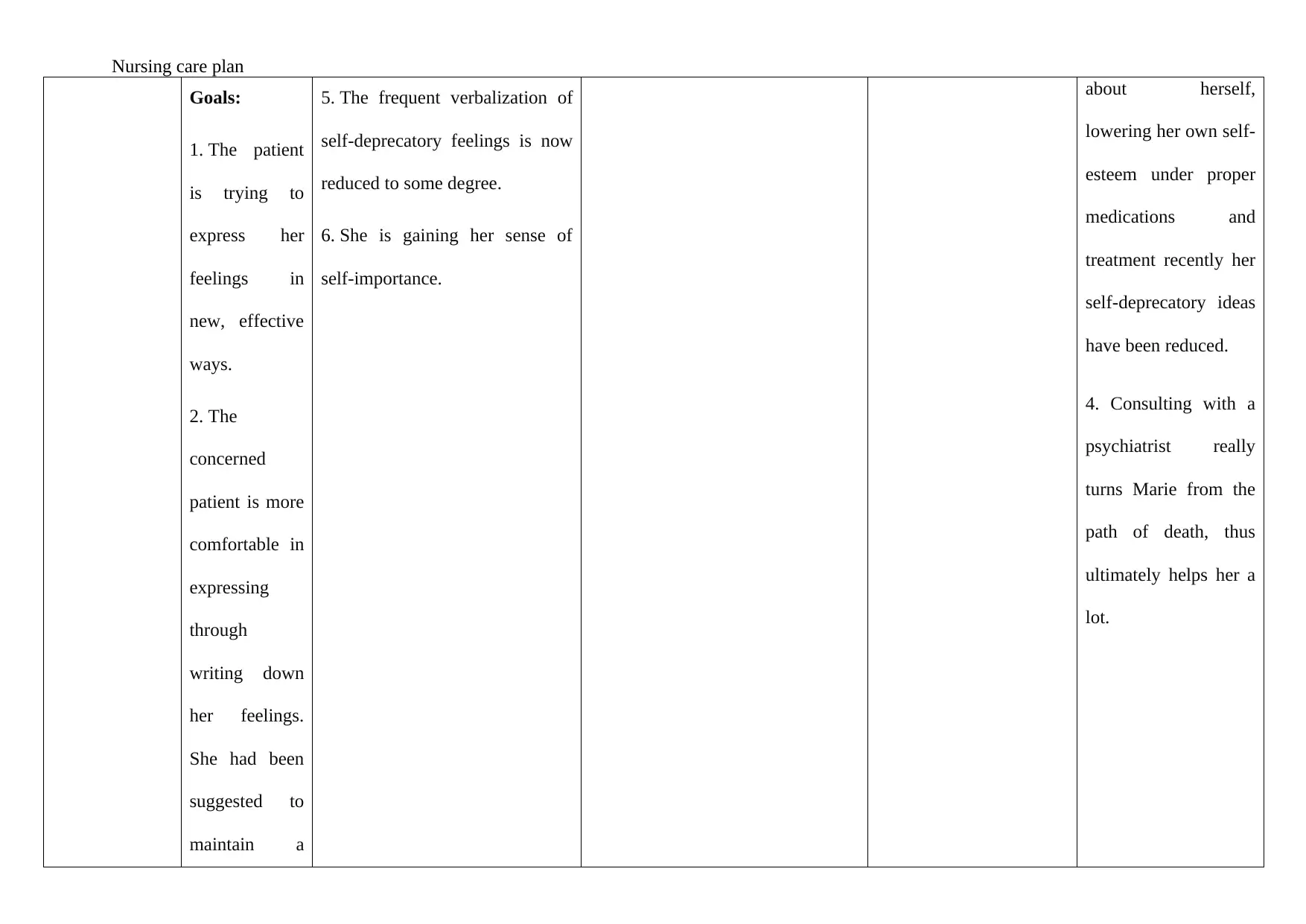
Nursing care plan
Goals:
1. The patient
is trying to
express her
feelings in
new, effective
ways.
2. The
concerned
patient is more
comfortable in
expressing
through
writing down
her feelings.
She had been
suggested to
maintain a
5. The frequent verbalization of
self-deprecatory feelings is now
reduced to some degree.
6. She is gaining her sense of
self-importance.
about herself,
lowering her own self-
esteem under proper
medications and
treatment recently her
self-deprecatory ideas
have been reduced.
4. Consulting with a
psychiatrist really
turns Marie from the
path of death, thus
ultimately helps her a
lot.
Goals:
1. The patient
is trying to
express her
feelings in
new, effective
ways.
2. The
concerned
patient is more
comfortable in
expressing
through
writing down
her feelings.
She had been
suggested to
maintain a
5. The frequent verbalization of
self-deprecatory feelings is now
reduced to some degree.
6. She is gaining her sense of
self-importance.
about herself,
lowering her own self-
esteem under proper
medications and
treatment recently her
self-deprecatory ideas
have been reduced.
4. Consulting with a
psychiatrist really
turns Marie from the
path of death, thus
ultimately helps her a
lot.
Paraphrase This Document
Need a fresh take? Get an instant paraphrase of this document with our AI Paraphraser
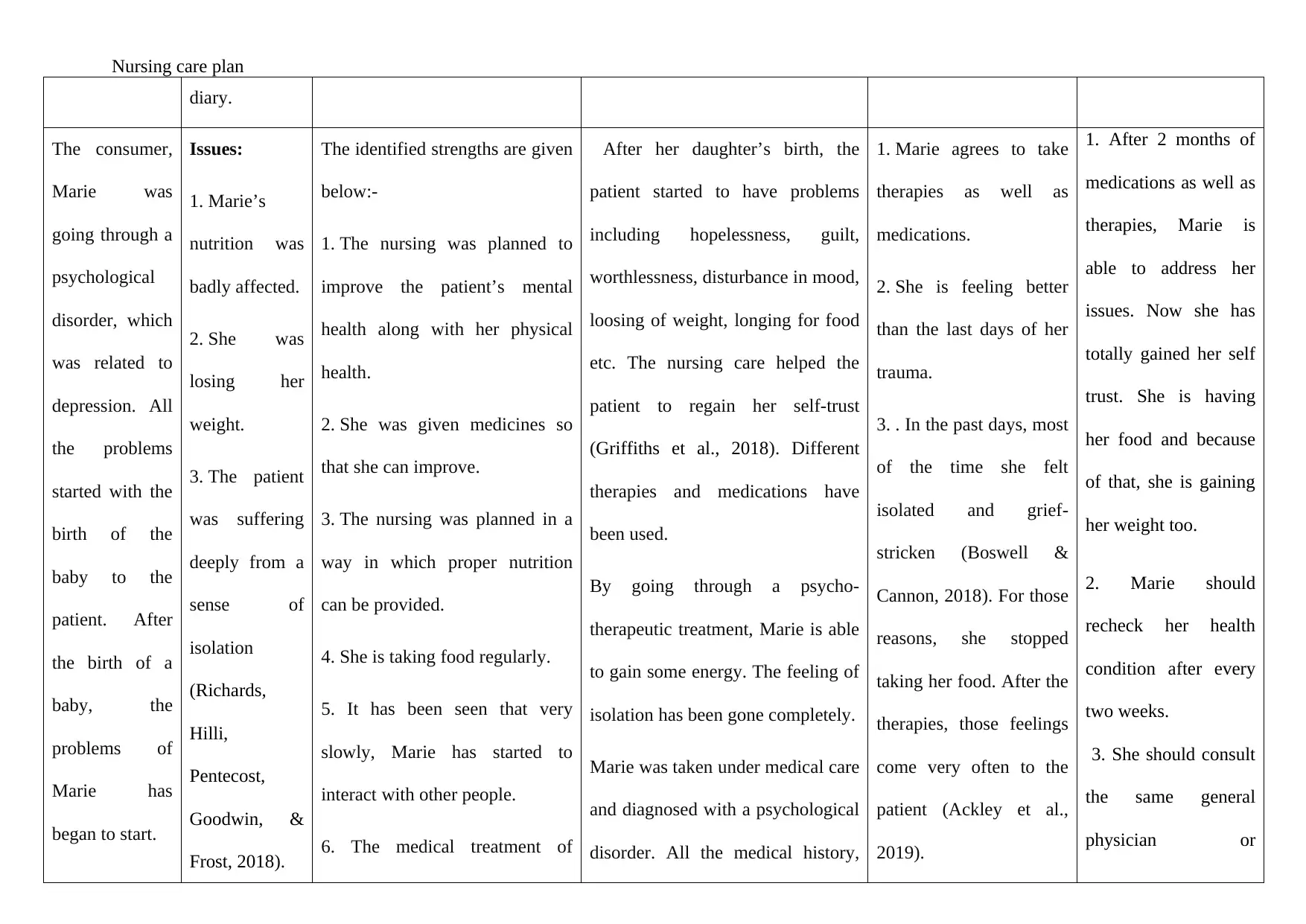
Nursing care plan
diary.
The consumer,
Marie was
going through a
psychological
disorder, which
was related to
depression. All
the problems
started with the
birth of the
baby to the
patient. After
the birth of a
baby, the
problems of
Marie has
began to start.
Issues:
1. Marie’s
nutrition was
badly affected.
2. She was
losing her
weight.
3. The patient
was suffering
deeply from a
sense of
isolation
(Richards,
Hilli,
Pentecost,
Goodwin, &
Frost, 2018).
The identified strengths are given
below:-
1. The nursing was planned to
improve the patient’s mental
health along with her physical
health.
2. She was given medicines so
that she can improve.
3. The nursing was planned in a
way in which proper nutrition
can be provided.
4. She is taking food regularly.
5. It has been seen that very
slowly, Marie has started to
interact with other people.
6. The medical treatment of
After her daughter’s birth, the
patient started to have problems
including hopelessness, guilt,
worthlessness, disturbance in mood,
loosing of weight, longing for food
etc. The nursing care helped the
patient to regain her self-trust
(Griffiths et al., 2018). Different
therapies and medications have
been used.
By going through a psycho-
therapeutic treatment, Marie is able
to gain some energy. The feeling of
isolation has been gone completely.
Marie was taken under medical care
and diagnosed with a psychological
disorder. All the medical history,
1. Marie agrees to take
therapies as well as
medications.
2. She is feeling better
than the last days of her
trauma.
3. . In the past days, most
of the time she felt
isolated and grief-
stricken (Boswell &
Cannon, 2018). For those
reasons, she stopped
taking her food. After the
therapies, those feelings
come very often to the
patient (Ackley et al.,
2019).
1. After 2 months of
medications as well as
therapies, Marie is
able to address her
issues. Now she has
totally gained her self
trust. She is having
her food and because
of that, she is gaining
her weight too.
2. Marie should
recheck her health
condition after every
two weeks.
3. She should consult
the same general
physician or
diary.
The consumer,
Marie was
going through a
psychological
disorder, which
was related to
depression. All
the problems
started with the
birth of the
baby to the
patient. After
the birth of a
baby, the
problems of
Marie has
began to start.
Issues:
1. Marie’s
nutrition was
badly affected.
2. She was
losing her
weight.
3. The patient
was suffering
deeply from a
sense of
isolation
(Richards,
Hilli,
Pentecost,
Goodwin, &
Frost, 2018).
The identified strengths are given
below:-
1. The nursing was planned to
improve the patient’s mental
health along with her physical
health.
2. She was given medicines so
that she can improve.
3. The nursing was planned in a
way in which proper nutrition
can be provided.
4. She is taking food regularly.
5. It has been seen that very
slowly, Marie has started to
interact with other people.
6. The medical treatment of
After her daughter’s birth, the
patient started to have problems
including hopelessness, guilt,
worthlessness, disturbance in mood,
loosing of weight, longing for food
etc. The nursing care helped the
patient to regain her self-trust
(Griffiths et al., 2018). Different
therapies and medications have
been used.
By going through a psycho-
therapeutic treatment, Marie is able
to gain some energy. The feeling of
isolation has been gone completely.
Marie was taken under medical care
and diagnosed with a psychological
disorder. All the medical history,
1. Marie agrees to take
therapies as well as
medications.
2. She is feeling better
than the last days of her
trauma.
3. . In the past days, most
of the time she felt
isolated and grief-
stricken (Boswell &
Cannon, 2018). For those
reasons, she stopped
taking her food. After the
therapies, those feelings
come very often to the
patient (Ackley et al.,
2019).
1. After 2 months of
medications as well as
therapies, Marie is
able to address her
issues. Now she has
totally gained her self
trust. She is having
her food and because
of that, she is gaining
her weight too.
2. Marie should
recheck her health
condition after every
two weeks.
3. She should consult
the same general
physician or
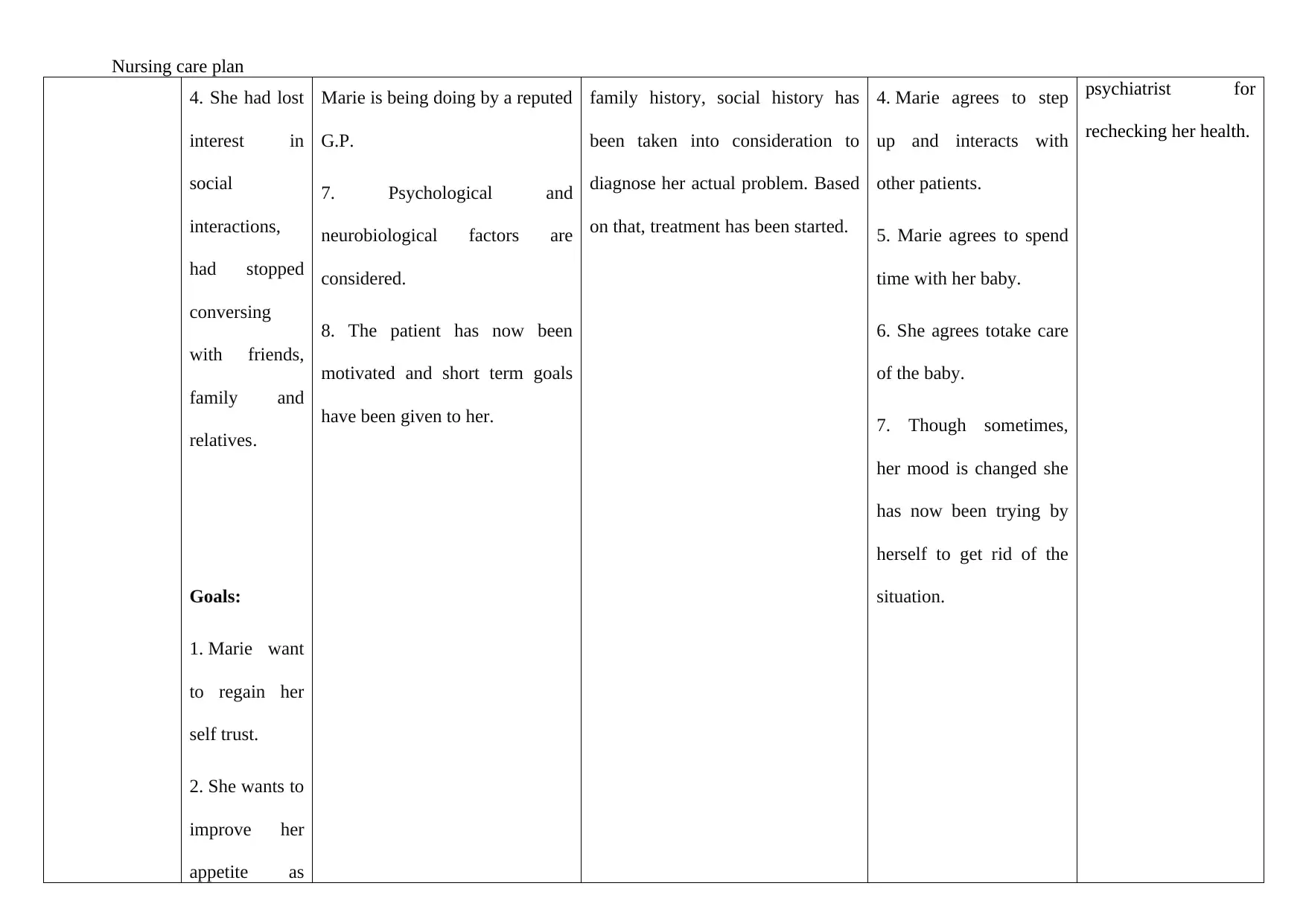
Nursing care plan
4. She had lost
interest in
social
interactions,
had stopped
conversing
with friends,
family and
relatives.
Goals:
1. Marie want
to regain her
self trust.
2. She wants to
improve her
appetite as
Marie is being doing by a reputed
G.P.
7. Psychological and
neurobiological factors are
considered.
8. The patient has now been
motivated and short term goals
have been given to her.
family history, social history has
been taken into consideration to
diagnose her actual problem. Based
on that, treatment has been started.
4. Marie agrees to step
up and interacts with
other patients.
5. Marie agrees to spend
time with her baby.
6. She agrees totake care
of the baby.
7. Though sometimes,
her mood is changed she
has now been trying by
herself to get rid of the
situation.
psychiatrist for
rechecking her health.
4. She had lost
interest in
social
interactions,
had stopped
conversing
with friends,
family and
relatives.
Goals:
1. Marie want
to regain her
self trust.
2. She wants to
improve her
appetite as
Marie is being doing by a reputed
G.P.
7. Psychological and
neurobiological factors are
considered.
8. The patient has now been
motivated and short term goals
have been given to her.
family history, social history has
been taken into consideration to
diagnose her actual problem. Based
on that, treatment has been started.
4. Marie agrees to step
up and interacts with
other patients.
5. Marie agrees to spend
time with her baby.
6. She agrees totake care
of the baby.
7. Though sometimes,
her mood is changed she
has now been trying by
herself to get rid of the
situation.
psychiatrist for
rechecking her health.
⊘ This is a preview!⊘
Do you want full access?
Subscribe today to unlock all pages.

Trusted by 1+ million students worldwide
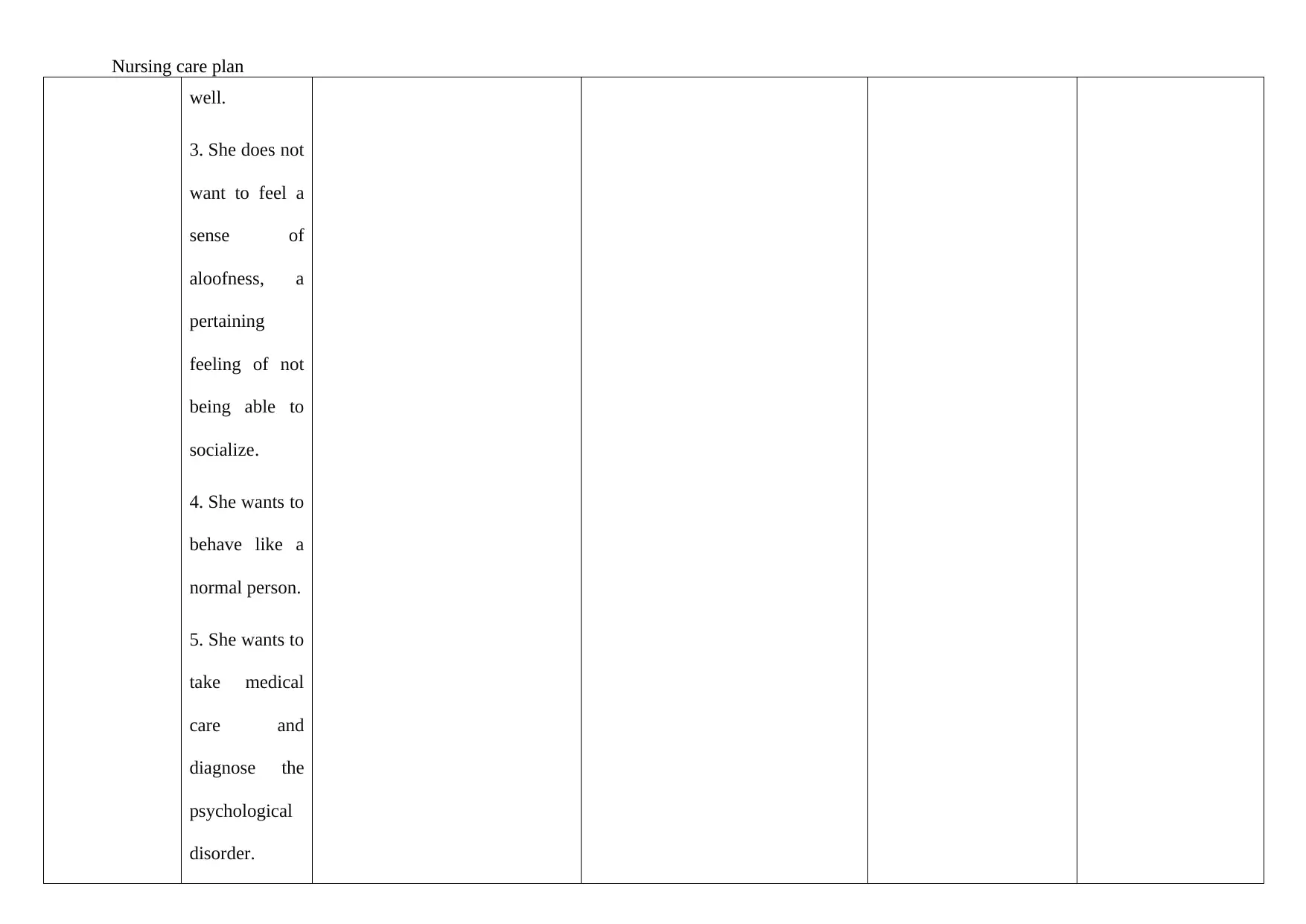
Nursing care plan
well.
3. She does not
want to feel a
sense of
aloofness, a
pertaining
feeling of not
being able to
socialize.
4. She wants to
behave like a
normal person.
5. She wants to
take medical
care and
diagnose the
psychological
disorder.
well.
3. She does not
want to feel a
sense of
aloofness, a
pertaining
feeling of not
being able to
socialize.
4. She wants to
behave like a
normal person.
5. She wants to
take medical
care and
diagnose the
psychological
disorder.
Paraphrase This Document
Need a fresh take? Get an instant paraphrase of this document with our AI Paraphraser
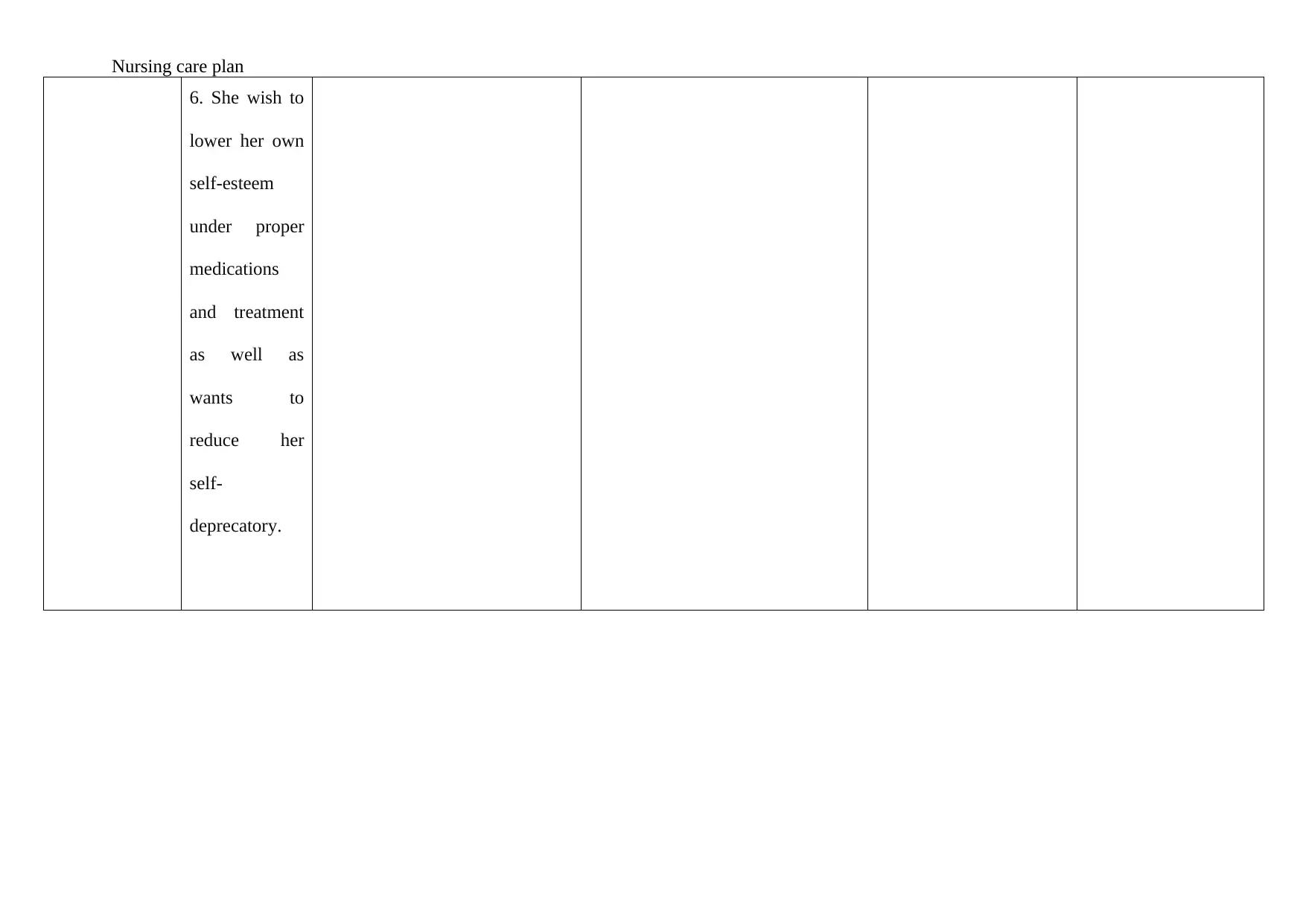
Nursing care plan
6. She wish to
lower her own
self-esteem
under proper
medications
and treatment
as well as
wants to
reduce her
self-
deprecatory.
6. She wish to
lower her own
self-esteem
under proper
medications
and treatment
as well as
wants to
reduce her
self-
deprecatory.
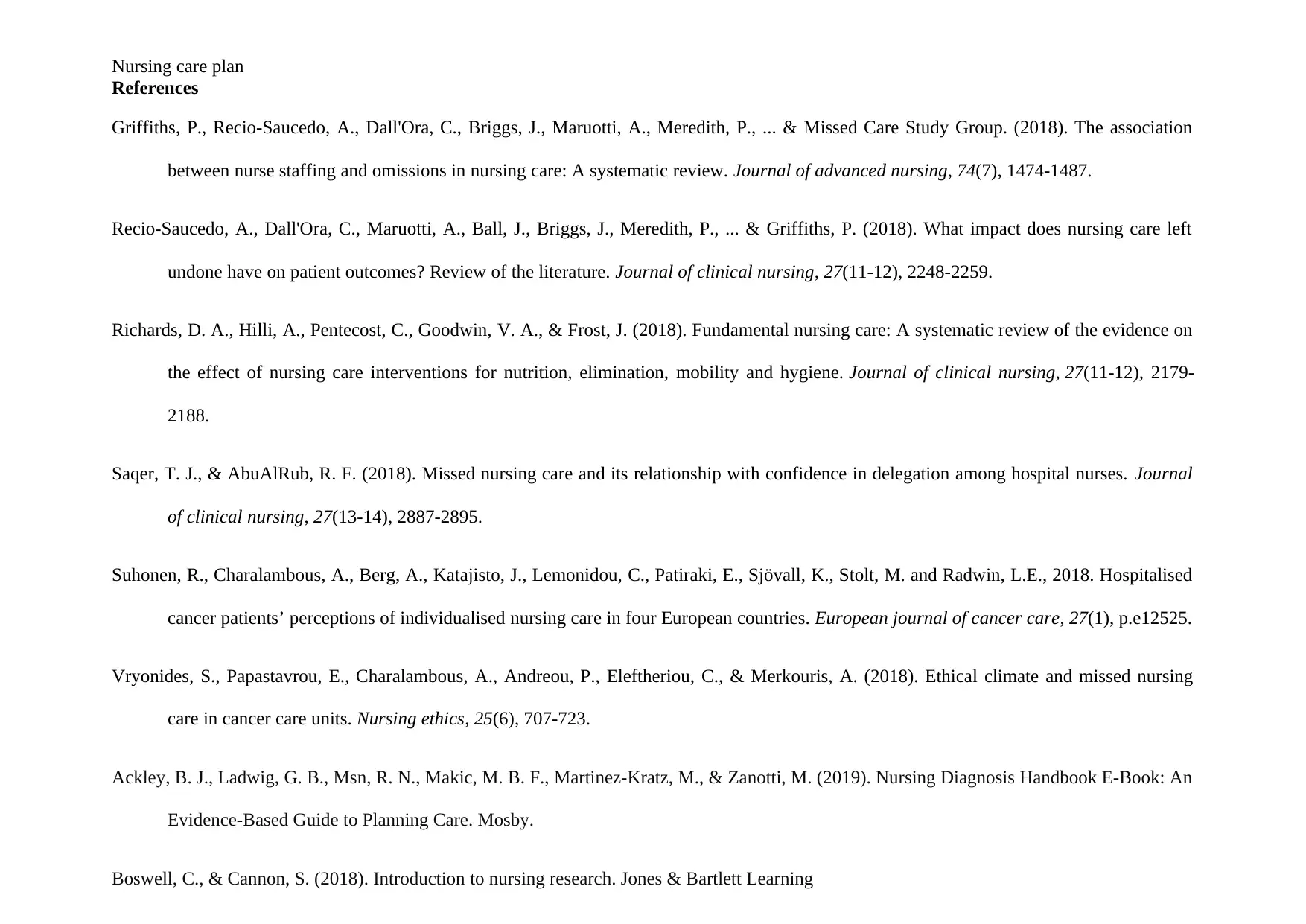
Nursing care plan
References
Griffiths, P., Recio‐Saucedo, A., Dall'Ora, C., Briggs, J., Maruotti, A., Meredith, P., ... & Missed Care Study Group. (2018). The association
between nurse staffing and omissions in nursing care: A systematic review. Journal of advanced nursing, 74(7), 1474-1487.
Recio‐Saucedo, A., Dall'Ora, C., Maruotti, A., Ball, J., Briggs, J., Meredith, P., ... & Griffiths, P. (2018). What impact does nursing care left
undone have on patient outcomes? Review of the literature. Journal of clinical nursing, 27(11-12), 2248-2259.
Richards, D. A., Hilli, A., Pentecost, C., Goodwin, V. A., & Frost, J. (2018). Fundamental nursing care: A systematic review of the evidence on
the effect of nursing care interventions for nutrition, elimination, mobility and hygiene. Journal of clinical nursing, 27(11-12), 2179-
2188.
Saqer, T. J., & AbuAlRub, R. F. (2018). Missed nursing care and its relationship with confidence in delegation among hospital nurses. Journal
of clinical nursing, 27(13-14), 2887-2895.
Suhonen, R., Charalambous, A., Berg, A., Katajisto, J., Lemonidou, C., Patiraki, E., Sjövall, K., Stolt, M. and Radwin, L.E., 2018. Hospitalised
cancer patients’ perceptions of individualised nursing care in four European countries. European journal of cancer care, 27(1), p.e12525.
Vryonides, S., Papastavrou, E., Charalambous, A., Andreou, P., Eleftheriou, C., & Merkouris, A. (2018). Ethical climate and missed nursing
care in cancer care units. Nursing ethics, 25(6), 707-723.
Ackley, B. J., Ladwig, G. B., Msn, R. N., Makic, M. B. F., Martinez-Kratz, M., & Zanotti, M. (2019). Nursing Diagnosis Handbook E-Book: An
Evidence-Based Guide to Planning Care. Mosby.
Boswell, C., & Cannon, S. (2018). Introduction to nursing research. Jones & Bartlett Learning
References
Griffiths, P., Recio‐Saucedo, A., Dall'Ora, C., Briggs, J., Maruotti, A., Meredith, P., ... & Missed Care Study Group. (2018). The association
between nurse staffing and omissions in nursing care: A systematic review. Journal of advanced nursing, 74(7), 1474-1487.
Recio‐Saucedo, A., Dall'Ora, C., Maruotti, A., Ball, J., Briggs, J., Meredith, P., ... & Griffiths, P. (2018). What impact does nursing care left
undone have on patient outcomes? Review of the literature. Journal of clinical nursing, 27(11-12), 2248-2259.
Richards, D. A., Hilli, A., Pentecost, C., Goodwin, V. A., & Frost, J. (2018). Fundamental nursing care: A systematic review of the evidence on
the effect of nursing care interventions for nutrition, elimination, mobility and hygiene. Journal of clinical nursing, 27(11-12), 2179-
2188.
Saqer, T. J., & AbuAlRub, R. F. (2018). Missed nursing care and its relationship with confidence in delegation among hospital nurses. Journal
of clinical nursing, 27(13-14), 2887-2895.
Suhonen, R., Charalambous, A., Berg, A., Katajisto, J., Lemonidou, C., Patiraki, E., Sjövall, K., Stolt, M. and Radwin, L.E., 2018. Hospitalised
cancer patients’ perceptions of individualised nursing care in four European countries. European journal of cancer care, 27(1), p.e12525.
Vryonides, S., Papastavrou, E., Charalambous, A., Andreou, P., Eleftheriou, C., & Merkouris, A. (2018). Ethical climate and missed nursing
care in cancer care units. Nursing ethics, 25(6), 707-723.
Ackley, B. J., Ladwig, G. B., Msn, R. N., Makic, M. B. F., Martinez-Kratz, M., & Zanotti, M. (2019). Nursing Diagnosis Handbook E-Book: An
Evidence-Based Guide to Planning Care. Mosby.
Boswell, C., & Cannon, S. (2018). Introduction to nursing research. Jones & Bartlett Learning
⊘ This is a preview!⊘
Do you want full access?
Subscribe today to unlock all pages.

Trusted by 1+ million students worldwide
1 out of 13
Related Documents
Your All-in-One AI-Powered Toolkit for Academic Success.
+13062052269
info@desklib.com
Available 24*7 on WhatsApp / Email
![[object Object]](/_next/static/media/star-bottom.7253800d.svg)
Unlock your academic potential
Copyright © 2020–2026 A2Z Services. All Rights Reserved. Developed and managed by ZUCOL.





